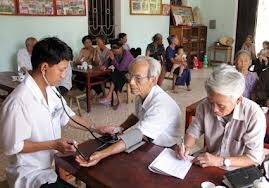(VOVworld) – Among many issues relating to human rights, the Vietnamese government gives top priority to ensuring social security. In the context of the global economic recession, Vietnam has concentrated more on social security and considered it an important factor for improving human rights.

Ensuring social security is important for improving human rights
|
Social security is associated with such human rights as the right to have a job, income, housing, access to education, healthcare, and safe water, and live in a secure environment. Social security is for all people - people with disabilities, the poor, the lonely elderly, homeless children, natural disaster victims, and other vulnerable groups. It’s in line with Party and State targets at all revolutionary stages and during the current renewal process. The Party and State’s policy of promoting social security is shown through commitments and socio-economic management. Prime Minister Nguyen Tan Dung underlined the issue at the ASEM ministerial conference on labor and employment in Hanoi in October. "Economic development attached to ensuring social security is a consistent policy of the Vietnamese government. In recent years, despite limited resources, the Vietnamese government has reinforced and implemented policies on employment and social security. The policies have been revised and amended to expand the categories of beneficiaries and increase the level of assistance. The government has imposed coordinated measures on employment, vocational training, and human resources development, and achieved significant results, helping to improve people’s living standard, guarantee social equality, and maintain social consensus and political stability."
Vietnam has had encouraging achievements in ensuring social security and human rights. From 2003 to 2011, Vietnam allocated an average of 6.6% of GDP for social security, of which 51% was from the state budget. The government issued 20 credit incentive regulations for the poor and people with disabilities, overseas workers, unemployed people, and poor households in disadvantaged areas. Last year, 10 million people had compulsory insurance. 100,000 had optional insurance. 7.6 million people registered for unemployment insurance. 57 million people, 62% of Vietnam’s population, bought health insurance.
Vietnam’s social security indexes - eliminating extremely poverty and hunger; universalizing primary school education, enhancing gender equality, and reducing child fatalities - were acknowledged by the UN in 2000, when Vietnam completed its Millennium Development Goals ahead of its 2015 targets. National Assembly Vice Chairman Nguyen Thi Kim Ngan talks about gender equality in Vietnam: "Gender equality implementation results in Vietnam have been ranked higher than in other countries with the same level of development and income. Vietnam was recognized as the fastest nation to narrow the gender gap in 20 years in Southeast Asia. The Party and State’s policies and the people’s efforts, Vietnamese women have been able to make important contributions to the nation in governance, production, trade, external affairs, science, technology, and family building."
Vietnam has developed a diverse and thorough social security system, which is more compliant with the UN charter. Vietnam hopes to have a welfare network for all people by 2020. The country plans to allocate 13.5% of GDP for social security from now until 2020 and accelerate the resolution on sustainable poverty reduction. Vietnam will make a national report on social security and the social security index as a foundation for evaluating social security performance in each period.